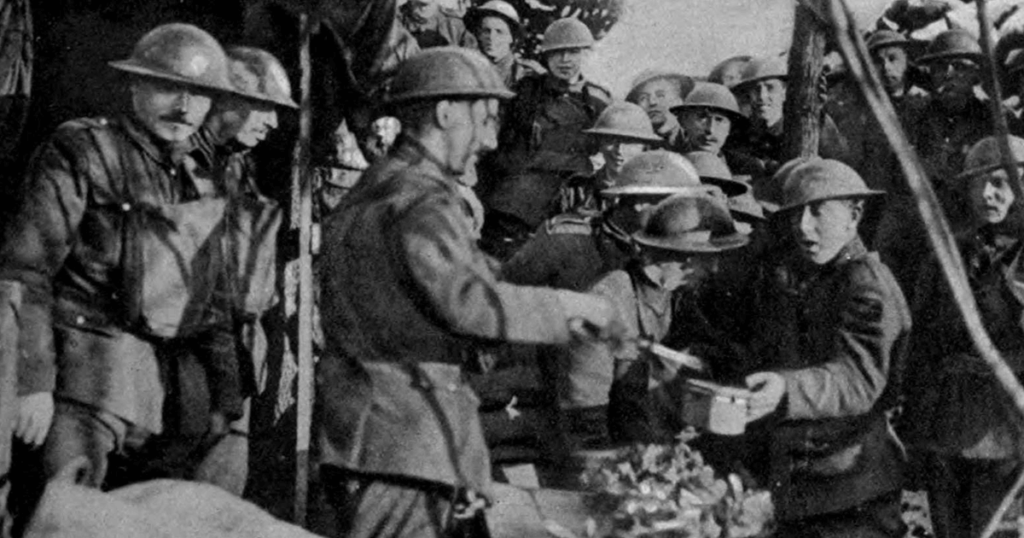
Last week, on an archeological dig through some fragments of my past, I came upon a mimeographed sheet of paper. It was folded in half, and on the front flap, in typewritten letters pale with age, were the words:
THE 885TH BOMB SQD.
ENLISTED MEN’S MESS
WISHES YOU A VERY
MERRY CHRISTMAS
It was the menu for my 1944 Christmas dinner.
I was an Army sergeant attached to an Air Force squadron that dropped supplies at night to partisans in Nazi-occupied Europe. We were stationed at a base in the heel of Italy, a region of desolate poverty. I don’t remember that our life had any graces. We lived in tents, hunched against the frozen Italian winter, keeping warm with a makeshift stove that we ran on the same high-octane gas that fueled the bombers.
Yet someone had gone to the trouble of typing out a Christmas menu, arranging the appetizers and entrees and fixings in descending tiers, according to the conventions of restaurant typography. The first tier said:
Fruit Cocktail
Stuffed Celery Olives
Turkey Soup Pickles
Croutons Giblet Gravy
Next, in similar groupings, came Roast Turkey, Bread Dressing, Creamed Potatoes, Hot Rolls, Bread, Butter, String Beans, Cranberry Sauce, Marmalade, Coffee, Cream and Sugar, Pumpkin Pie, Mince Pie, Cookies, Oranges, Tangerines, and Fruit Punch.
Turning the page, I found another block of typing:
Alone of all American holidays, Christmas has been held inviolate, and will be observed throughout the Army by order of the War Department. By this wise exception men may have a brief respite from the grim business of war to restock their spiritual strength and reexamine their position in terms of the religion of their nation. This they may do with an untroubled conscience. They will reflect that the tenets preached by Him whose birthday is holy throughout the western world are sound, worth dying for, the very marrow of our culture. That some of these professed tenets may not be practiced for awhile is due to human failings and makes them not less true. They have been appraised in the perspective of time, they have survived many wars, and will survive this one.
With stout hearts, we see victory, if not near, certainly clearly in view. Then and only then we may resume our cherished habit of peace on earth and good will to all men.
Who wrote that? I wondered. Churchillian eloquence isn’t ordinarily associated with the Pentagon. Whoever it was, I like to think that for a few moments, in that forsaken place so far from home, all of us—including non-Christians and non-believers—were comforted and nourished by his words.
Looking at that menu today, so many Christmases later, I think of all the places where young American men and women have since been sent—Korea, Vietnam, the Persian Gulf, Iraq, Afghanistan—to fight wars that were more ambiguous. Ours was the last “good” war; we never doubted that the Nazis and the Japanese had to be defeated. We saved the world and sailed through life secure in the gratitude of our countrymen.
In 1998 we were anointed “the greatest generation” by Tom Brokaw in his best-selling book, which coincided with the huge box-office success of Steven Spielberg’s World War II movie Saving Private Ryan, about the heroic invasion of Normandy. The greatest generation never looked better. Then, suddenly, it didn’t. Another World War II movie epic, Flags of Our Fathers, about the equally heroic battle of Iwo Jima, quickly withered away, and so did much of the popular interest in the greatest generation.
Well, that’s, as they say, life. One day you’re the greatest generation and the next day you’re not. I’ll admit that I enjoyed the ride—getting up every morning and thinking, “Hey, we’re numero uno!” But I gladly accept our demotion to Generation Ex.
What I now think is that all of us who fight the nation’s wars are one generation and we’re all the greatest. Nobody has been any better than the men and women fighting and dying today in Iraq and Afghanistan. God bless us all. And wherever you are, on December 25, 2010, Merry Christmas!


